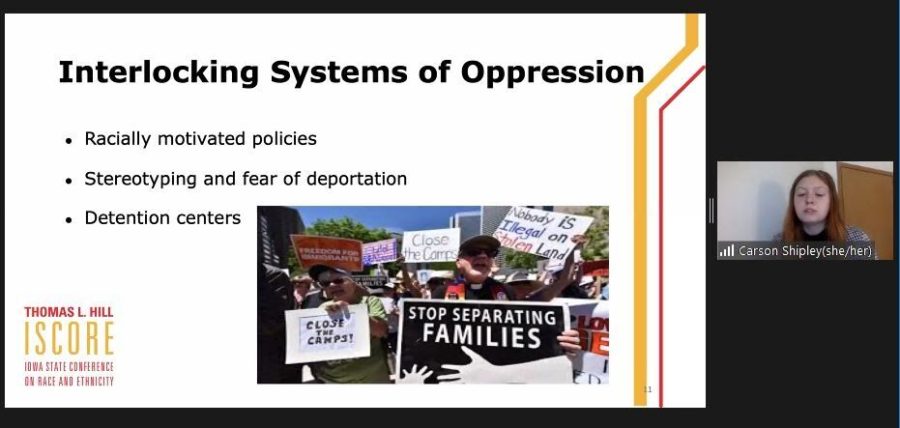The oppression of Latinx individuals and immigration
The systems of oppression in regards to immigration were presented during an ISCORE breakout session.
March 5, 2021
Edith Barton, sophomore in entrepreneurship, and Carson Shipley, junior in child, adult and family services, presented “Breaking Down The Wall: Examining the Effects of United States Immigration Policy on Latinx Women” on Friday for the Iowa State Conference on Race and Ethnicity (ISCORE).
The speakers talked about the CARE structure, relationship and agency aspects that affect Latinx undocumented women in the U.S.
To gain more understanding on the U.S. border policies and the profound impacts deportation has on generations and communities of Latinx individuals with a focus on women, Barton and Shipley reached out to Beatriz Aldana Marquez, whose research focused on the impacts of displacement on vulnerable communities in the U.S. and operation of the Immigration and Customs Enforcement.
They found out that deportation trials are not held as crime trials, so the court system doesn’t provide free legal representation for undocumented immigrants, not even for children, meaning those facing trials have to hire their own lawyers. However, not everyone can afford the costs.
Barton and Shipley also talked about the poor jobs done inside detention facilities regarding investigating deaths of detainees, separation of families and the post-deportation traumas. They also found out many undocumented women that suffered sexual abuse in these centers tend to stay quiet about their abuser in fear of facing deportation. Not only that, but many women struggle to receive medical care and attention needed in detention centers, as well as social services for their kids.
However, Barton and Shipley were surprised at the Latinx women community and their resilience toward facing injustice and how empowering it felt. The speakers encouraged the audience to take action by getting educated on the issue, integrating awareness in their lives and being empathetic and open to those that want to share their experiences regarding immigration trauma.
For more information, visit the Refugee and Immigrant Center for Education and Legal Services (RAICES) website.

















